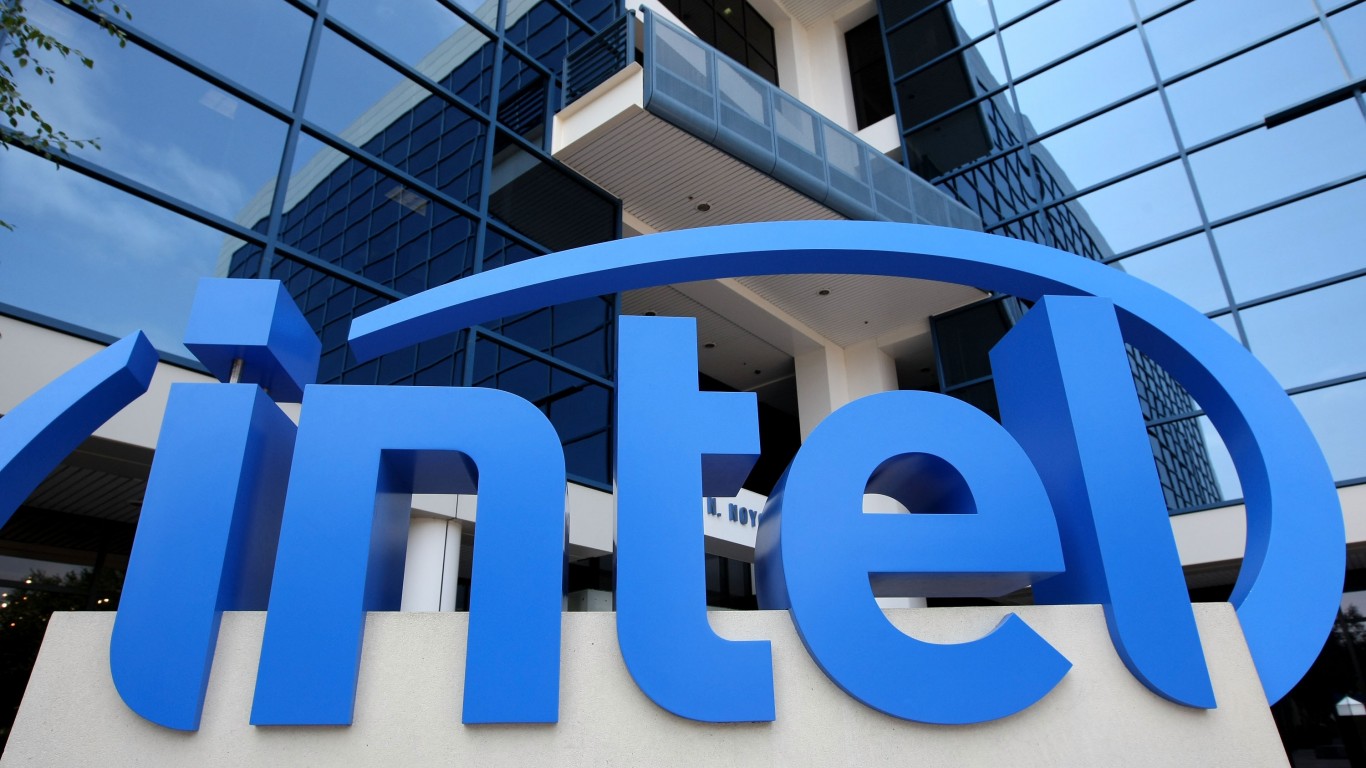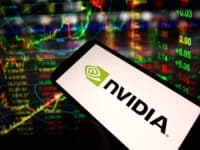
It takes a certain kind of courage to short sell blue chips, such as the Dow Jones industrial average components. Short sellers are betting on these companies to fail, or at least for their share prices to fall handily. Plus, those sellers are responsible for paying the dividends on the stocks they short.
Maybe it is little wonder that only two of the 30 Dow stocks had notable short interest between June 28 and July 15; that is, more than 50 million shares short. In fact, just seven of them had short interest of more than 30 million shares.
While the bull market is quite long in the tooth — more than 10 years old — and concern about a possible recession remains as the trade war with China drags on, the markets are still near all-time highs. Investors may wonder then what the short sellers expect from some of the biggest, most well-respected names on Wall Street.
As of the July 15 settlement date, the most recently reported period, short sellers favored Intel Corp. (NASDAQ: INTC), Pfizer Inc. (NYSE: PFE) and Microsoft Corp. (NASDAQ: MSFT) above all other Dow stocks.
Intel
> Shares short: over 61.05 million
> Change from prior period: 9.2%
> Percentage of float: 1.4
The number of shares short has now increased in three of the past five periods, and it has only been higher in one other period this year. The average daily trading volume decreased again in the latest period, and as of the middle of this month, it would take more than three days for investors to cover all their short positions.
A profit warning from Samsung weighed on semiconductor leaders during the period. The share price ended the first two weeks of July 1% or so higher, though it had been down almost 4% earlier in the month. The Nasdaq also saw a gain of more than 1% in that time as well, though it pulled back a bit afterward.
Intel was trading most recently at $52.92 a share, down handily from the multiyear high of $59.59 seen this spring. The 52-week low is $42.36 per share. Note that the latest share price is more than 12% higher than at the beginning of the year, while the Nasdaq is up more than 25% year to date and the Dow has seen a gain of almost 17%.
Pfizer
> Shares short: about 57.72 million
> Change from prior period: 1.3%
> Percentage of float: 1.0
Pfizer’s reign as king of the hill, which began in May, has ended, with this stock dropping to the number two spot on this list despite a marginal increase in short interest in the latest period. Note though that the latest figure is nowhere near the 156 million shares short back in January.
Pfizer released some disappointing trial data at the end of June, but like other drugmakers benefited from a court ruling on prices this month. The shares ended the short interest period less than 2% lower than where they started, though they had been up over 2% at one point. Meanwhile, the Dow gained almost 2% between the settlement dates.
Shares closed most recently at $42.89 apiece, about the same price as a week ago. Pfizer’s 52-week low of $37.56 was seen almost a year ago, and the 52-week high of $46.47 was from this past December. The stock now is trading less than 2% lower than at the beginning of the year.
Microsoft
> Shares short: nearly 49.70 million
> Change from prior period: 3.5%
> Percentage of float: 0.7
The number of its shares short has risen for four consecutive periods, but the 52-week high was more than 58 million shares short, posted in January. The average daily trading volume shrank to its lowest level since April, so by the most recent settlement date, the number of days it would take for investors to cover all their short positions had risen to more than two, also a 52-week high.
Microsoft led the Dow Jones industrials toward new all-time highs between the latest settlement dates. Short sellers watched the share price rise about 2% in the period, though it plateaued in the final couple of days. The S&P 500 saw a gain of 1% or so in the first two weeks of this month.
After rising nearly 4% in the past week, Microsoft stock ended trading most recently at $140.72 a share. That was in a 52-week range of $93.96 (seen last December) to $140.74 (this week). The share price is more than 38% higher than at the beginning of the year, compared to that gain of nearly 17% for the Dow.
And the Rest
Rounding out the top seven most shorted Dow stocks on the most recent settlement date were Apple Inc. (NASDAQ: AAPL) and Cisco Systems Inc. (NASDAQ: CSCO). Both of these stocks saw decreases in the number of their shares short during the first two weeks of July. Share prices of each rose in that time, though Apple was in the red for part of the period. An apparent trade ceasefire with China helped buoy the iPhone maker during those two weeks. Cisco still may be a good pick for long-term investors.
Also notice on the following list short interest changes in Dow stocks as of July 15 the big swings at Boeing (737 MAX grounding), Goldman Sachs (earnings expectations) and IBM (Red Hat acquisition):
| Dow Stock | Short (millions) | Change | % Float |
|---|---|---|---|
| Intel | 61.05 | 9.17% | 1.36% |
| Pfizer | 57.72 | 1.31% | 1.00% |
| Microsoft | 49.70 | 3.53% | 0.66% |
| Apple | 42.43 | −2.35% | 0.90% |
| Cisco | 39.91 | −16.04% | 0.91% |
| Exxon | 35.60 | 7.55% | 0.84% |
| Verizon | 31.41 | −4.07% | 0.76% |
| Visa | 29.66 | 6.01% | 1.70% |
| Coca-Cola | 28.32 | 1.44% | 0.67% |
| Walgreens | 24.94 | 6.22% | 3.14% |
| JPMorgan | 21.98 | −2.25% | 0.68% |
| Procter & Gamble | 18.95 | −10.14% | 0.76% |
| Merck | 18.94 | −2.07% | 0.73% |
| Chevron | 18.41 | −3.84% | 0.97% |
| Disney | 17.00 | −0.40% | 1.14% |
| IBM | 16.95 | 12.03% | 1.90% |
| Walmart | 16.83 | 6.17% | 1.18% |
| Johnson & Johnson | 14.72 | 3.74% | 0.55% |
| 3M | 11.16 | 7.24% | 1.94% |
| Home Depot | 10.18 | 5.46% | 0.90% |
| Nike | 8.58 | −1.75% | 0.69% |
| Goldman Sachs | 7.43 | 12.64% | 2.16% |
| Caterpillar | 7.42 | 0.82% | 1.29% |
| UnitedHealth | 7.16 | 7.37% | 0.75% |
| McDonald’s | 6.83 | 0.19% | 0.89% |
| Dow | 6.70 | 7.68% | N/A |
| American Express | 5.47 | −11.44% | 0.65% |
| Travelers | 5.40 | 20.40% | 2.06% |
| United Technologies | 5.34 | −9.80% | 0.62% |
| Boeing | 4.32 | −23.29% | 0.77% |
Travel Cards Are Getting Too Good To Ignore (sponsored)
Credit card companies are pulling out all the stops, with the issuers are offering insane travel rewards and perks.
We’re talking huge sign-up bonuses, points on every purchase, and benefits like lounge access, travel credits, and free hotel nights. For travelers, these rewards can add up to thousands of dollars in flights, upgrades, and luxury experiences every year.
It’s like getting paid to travel — and it’s available to qualified borrowers who know where to look.
We’ve rounded up some of the best travel credit cards on the market. Click here to see the list. Don’t miss these offers — they won’t be this good forever.
Thank you for reading! Have some feedback for us?
Contact the 24/7 Wall St. editorial team.

 24/7 Wall St.
24/7 Wall St.



